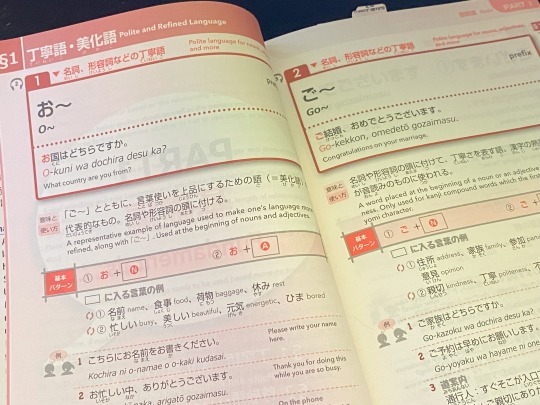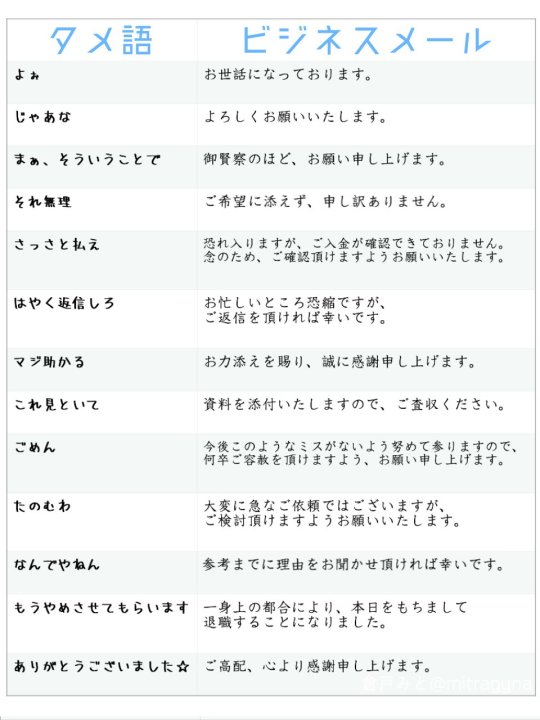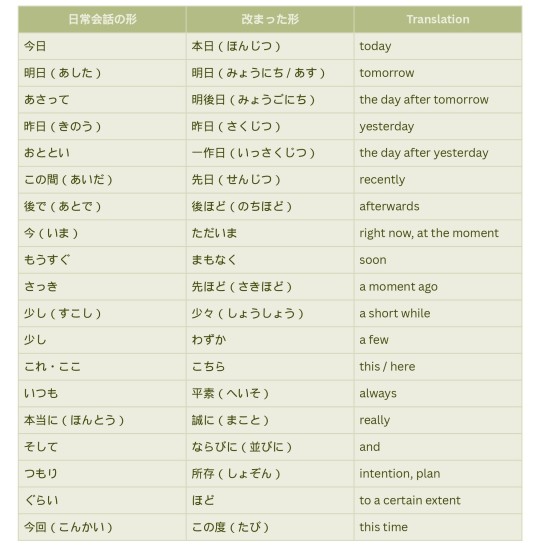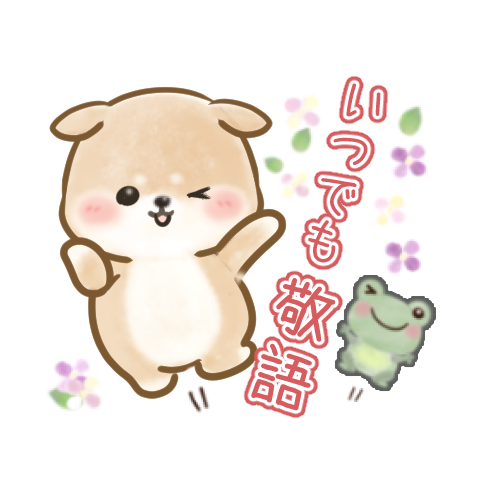#敬語
Explore tagged Tumblr posts
Text
お~ & ご~ Polite Language
丁寧語 (ていねいご・Polite Language)・美化語 (びかご・Refined Language)
Two of the major components of polite and refined language (丁寧語 and 美化語) are the prefixes お~ and ご~. Both can be represented by the kanji 御 (and in some cases it can also be pronounced おん). There is no hard and fast rule as to which words do and don't use お~ or ご~ so in general you need to memorize which words can have this prefix as well as which reading to use (although often it is written in kana). However, there are a few general principles which can help you to choose.

お~
Language used to make one's language more refined. Used at the beginning of nouns and adjectives. It can also be used with verb stems and adverbs in certain situations. In general, お~ attaches to nouns that are native Japanese words (和語, わご), but some words of Chinese origin (漢語, かんご) can also take this prefix. Words with this prefix are often related to words used in daily life, such as food and drink, or things related to everyday tasks.
ご~
A word placed at the beginning of a noun or adjective to indicate politeness. Only used for kanji compound words in which the first character is an on'yomi character, therefore words of Chinese origin (漢語, かんご). The words attached to this prefix are often abstract nouns, and not physical objects. There are a few native Japanese (和語, わご) adverbs and adjectives that can use this prefix. While お~ is usually in kana, ご~ is most commonly written in kanji.
Integrated Words
お and ご have become such an integral part of some words, that they cannot be removed and do not add politeness or respect to the word.
Examples:
おにぎり onigiri, rice ball
おはよう good morning
おなら fart
ごめん sorry
ごはん meal, rice
Deciding whether to use お~ or ご~ or no prefix at all
お~ and ご~ are often used to convey a feeling or respect or politeness towards the person you are addressing, so while you often use it with words that belong to the person, words that don't belong to the person are less commonly heard. お車 (おくるま) can be used to talk about a superior's car, but you wouldn't say お飛行機 (おひこうき) or お電車 (おでんしゃ) because those don't belong to them.
お~ and ご~ aren't used with katakana words, so you won't find it used with loan words. However, おトイレ can be used, probably because it is an everyday word.
What about おん?
In spoken formal Japanese, 御 is pronounced as おん when the word it is attached to is referring to an organization. For example: 御社 (おんしゃ, your (someone else's) company), and 御校 (おんこう, your (someone else's) school). [Note: In formal writing, 貴社 (きしゃ, your company) and 貴校 (きこう, your school) are used.] You can also read 御礼 (gratitude) as either おれい or おんれい, with おんれい being the more formal of the two.
Oh wait, I forgot to mention み~
A much less common reading of the prefix 御 is み, which is specifically used when talking about or to someone who deserves the highest respect - Buddha, God, the emperor, members of the imperial family. 御心 is usually read as おここ�� but is read as みこころ when referring to the 心 (heart/love) of Buddha, God, or the emperor. 御国 (みくに) is country, 御名 (みな) is name, 御手 (みて) is hand, 御顔 (みかお) is face, and 御霊 (みたま) is spirit when referring to these entities of high respect.
And then there is ぎょ~
When 御 is read as ぎょ it shows respect to the emperor and his family, whether it's used as a prefix or not. 崩御 (ほうぎょ) is used only to refer to the death of the emperor or a member of the imperial family. Most of the words using ぎょ are very specialized, however a few are known in mainstream use. 御意 (ぎょい) originally was used to talk about the will of the emperor, but came to mean "as you wish" and can be used for anyone of a higher status than you. It is in use today, but is very formal and a bit old-fashioned. It's most common in writing. 御者 (ぎょしゃ) originally meant a coachman who drove a horse-drawn coach or carriage for the emperor and the imperial family, but today it is a general word for coachman.
Examples
Now to the examples!
Nouns
お名前 おなまえ name
ご家族 ごかぞく family
Adjectives
お優しい おやさしい kind
ご丁寧 ごていねい polite
Adverbs
お近く おちかく near
ごゆっくり take your time
Verbs
Used with the pattern お・ご~する or お~になる
お預かりする おあずかりする to look after
ご活躍する ごかつやくする to be active
お食べになる おたべになる to eat
My textbook: 外国人のための日本語敬語の使い方基本表現85
#日本語#japanese#japanese language#japanese langblr#japanese studyblr#langblr#studyblr#敬語#丁寧語#美化語#formal japanese#keigo#polite language#respectful language#tokidokitokyo#tdtstudy
169 notes
·
View notes
Text
オフィスで耳にした単語(1)
名詞 // Nouns
演習(えんしゅう)practice 開発費(かいはつひ)development cost 奇数(きすう)uneven number 後半(こうはん)latter half 借金(しゃっきん)debt, loan 実践(じっせん)practice, implementation 消防設備点検(しょうぼうせつびてんけん)Fire Safety Equipment Inspection 消防(しょうぼう)fire fighting 設備(せつび)equipment 前半(ぜんはん)first half 貸与(たいよ)loan, lending 点検(てんけん)inspection 添付ファイル(てんぷ)attached file 備品(びひん)fixtures, furnishing, equpiment 部署(ぶしょ)department 予算(よさん)budjet
動詞 // Verbs
該当する(がいとう)meet (qualifications), falling under, being applicable 加担する(かたん)assist, participate, support 換算する(かんさん)convert (currency) 記載する(きさい)list, note, record 計算する(けいさん)calculate 実施する(じっし)carry out 借金する(しゃっきん)borrow money 出社する(しゅっしゃ)go to the office 請求する(せいきゅう)demand, charge, bill 使いこなす(つかいこなす)handle, master 投資する(とうし)invest 並び替える(ならびかえる)arrange 配布する(はいふ)distribute 儲ける(もうける)make profit, earn
形容詞 // Adjectives
細かい(こまかい)small 精神的な(せいしんてき)mental, spiritual, moral
その他 // Other
気合が入る(きあい が はいる)be motivated 掲題の件ですが…(けいだい)concerning the matter mentioned before (common expression in business emails) ご一読ください(いちどく)please, read it through 承知いたしました(しょうち)Understood 即座に(そくざ)right there on the spot 即興で(そっきょう)improvised, without any preperation 本日の勤務を終了いたします(ほんじつ は きんむ を ���ゅうりょう いたします)I am finishing work for today
#オフィスで耳にした単語#語彙リス��#敬語#japanese langblr#langblr#japanese language#language learning#japanese vocabulary#japanese studyblr#japanese#japan#learning japanese#study notes#studying#study movitation#nihongo#日本語#日本語の勉強#working in japan
179 notes
·
View notes
Photo

仕事でメールするときに見るやつです
そろそろ研修期間も終わる新社会人のみなさまへ、"謹んで”🎵
47 notes
·
View notes
Text
リンク: https://meetscareer.tenshoku.mynavi.jp/ を含む
"特に敬語に関する言葉では、こういうことはよくあるんです。それまで何の支障もなく使われていた言葉が、いつの間にか、誰が言い出すともなく失礼と見なされる。専門家は「敬意漸減(ぜんげん)の法則」などと呼んでいます。漸減、つまり少しずつ敬意がすり減ってくるわけですね。"
https://meetscareer.tenshoku.mynavi.jp/entry/20231109-iima#:~:text=%E7%89%B9%E3%81%AB%E6%95%AC%E8%AA%9E%E3%81%AB%E9%96%A2%E3%81%99%E3%82%8B%E8%A8%80%E8%91%89%E3%81%A7%E3%81%AF%E3%80%81%E3%81%93%E3%81%86%E3%81%84%E3%81%86%E3%81%93%E3%81%A8%E3%81%AF%E3%82%88%E3%81%8F%E3%81%82%E3%82%8B%E3%82%93%E3%81%A7%E3%81%99%E3%80%82%E3%81%9D%E3%82%8C%E3%81%BE%E3%81%A7%E4%BD%95%E3%81%AE%E6%94%AF%E9%9A%9C%E3%82%82%E3%81%AA%E3%81%8F%E4%BD%BF%E3%82%8F%E3%82%8C%E3%81%A6%E3%81%84%E3%81%9F%E8%A8%80%E8%91%89%E3%81%8C%E3%80%81%E3%81%84%E3%81%A4%E3%81%AE%E9%96%93%E3%81%AB%E3%81%8B%E3%80%81%E8%AA%B0%E3%81%8C%E8%A8%80%E3%81%84%E5%87%BA%E3%81%99%E3%81%A8%E3%82%82%E3%81%AA%E3%81%8F%E5%A4%B1%E7%A4%BC%E3%81%A8%E8%A6%8B%E3%81%AA%E3%81%95%E3%82%8C%E3%82%8B%E3%80%82%E5%B0%82%E9%96%80%E5%AE%B6%E3%81%AF%E3%80%8C%E6%95%AC%E6%84%8F%E6%BC%B8%E6%B8%9B%EF%BC%88%E3%81%9C%E3%82%93%E3%81%92%E3%82%93%EF%BC%89%E3%81%AE%E6%B3%95%E5%89%87%E3%80%8D%E3%81%AA%E3%81%A9%E3%81%A8%E5%91%BC%E3%82%93%E3%81%A7%E3%81%84%E3%81%BE%E3%81%99%E3%80%82%E6%BC%B8%E6%B8%9B%E3%80%81%E3%81%A4%E3%81%BE%E3%82%8A%E5%B0%91%E3%81%97%E3%81%9A%E3%81%A4%E6%95%AC%E6%84%8F%E3%81%8C%E3%81%99%E3%82%8A%E6%B8%9B%E3%81%A3%E3%81%A6%E3%81%8F%E3%82%8B%E3%82%8F%E3%81%91%E3%81%A7%E3%81%99%E3%81%AD%E3%80%82
0 notes
Link
新入社員向けのAIサービス。
確かに敬語って難しいので、こう言いたいけど敬語だとどうなるんだっけ?って思う時があるのでそういう時に使ってみるのは良いかもしれないですな。
ただ、個人的には使いすぎるのはあまり良くない気がしますな。。。
0 notes
Text


some helpful graphics explaining 尊敬語 and 謙譲語 (from 大人のための敬語の使い方BOOK)
46 notes
·
View notes
Text
i can’t talk to people about translation because i'll start losing it and gnawing at people’s ankles. my litmus test is that if you think manga translations should always keep in the -san/-kun/-chan/etc honorifics for official english localisations you need to stay at least 100 feet away from me at all times
#eloise talks#YES it can be a bitch to translate because honorifics convey loads of info about a characters relationship/status to others#NO it should not be kept in an english translation because it is. japanese.#and relies on you knowing japanese honorifics and what they mean to understand what they convey anyway#you will always lose things in translation. you make it work in other word choices and phrases#saw someone complain about a translation saying 敬語で話した方がいいよ was 'you should be more polite' once#because 'well actuallllly they didn't say that so its a bad translation. they said it's better to speak in keigo. localisers are stupid'#i dont have enough time in the world to explain how bad that take is
13 notes
·
View notes
Text
can someone let me know if there are a lot of subtitles in the new dune movie?? i really want to see it, but i live in Japan, and i wanna know how much fake-language talk id miss because it would be subbed in 日本語...
#dune#dune part 2#dune movie#dune 2#there is a chance i'd understand the subs but i dont trust my 敬語
4 notes
·
View notes
Text
敬語 - When, Where, Who?
敬語 (keigo) is honorific language, but in what situations do you use it and to whom? It's tricky because 敬語 is relative honorific language (it depends on the situation and person you are speaking with) and is thus broken up into three parts: polite & refined language, honorific language, and humble language.
丁寧語・美化語 (teineigo/bikago) Polite & Refined Language 丁寧語 = polite language (esp. the use of ~ます and ~です) 美化語 = refined language, elegant speech (esp. the use of the prefixes お~ and ご~)
尊敬語 (sonkeigo) Honorific Language
謙譲語・丁重語 (kenjyougo/teichougo) Humble Language 謙譲語 = humble language (i.e. humble language in which the listener [or a third party] is the indirect object of an action [or the recipient of an object, etc.]) 丁重語 = courteous language (i.e. humble language in which an action or object is not directed toward the listener or a third party)
Since 敬語 expressions for the same person can differ based on ウチ (uchi) and ソト (soto) - whether they are "in" your group or "out" of your group - the 敬語 you use will differ based on the relationship between the speaker, the listener, and the person being spoken about.
Factors that determine whether or not to use 敬語 and the appropriate level of 敬語 to use:
Relationship: Hierarchy (boss and subordinate, store manager and store employee, older and younger person, etc.) Social standing and role (customer and employee, teacher and student, guest and host, etc.) Level of intimacy (close relationship or first time meeting, length of relationship)
Place: Formal or casual situation (ceremony vs. cafe, business meeting vs. izakaya, etc.)
Intention: One's feelings towards the person being spoken to (level of gratitude or apology, who is profiting, etc.)
Generally speaking, 敬語 is based more on social position and standing than age. Intention is also a large part of the level of 敬語 one uses.
For example, if making a phone call will benefit the person being spoken to, you might use 「お電話差し上げます」 (o-denwa sashiagemasu), but if you, the speaker, would benefit from the call, you would instead express it in a way as though you are receiving permission to make the phone call, 「お電話させていただきます」 (o-denwa sasete itadakimasu). And even if the person being spoken to benefits from the situation, in order to show greater politeness to them you might use 「お電話させていただきます」 (o-denwa sasete itadakimasu) to convey your feelings of humility and to show that you are also benefiting from the situation.
This is why 敬語 can be difficult to master, even for native Japanese speakers. Not only does it need to be grammatically correct, it also involves thinking about how to express yourself towards the other party.
#日本語#japanese#japanese language#japanese langblr#japanese studyblr#敬語#keigo#丁寧語#美化語#尊敬語#謙譲語#丁重語#tokidokitokyo#tdtstudy
106 notes
·
View notes
Text
改まった形|Polite Forms
In formal settings like in a business meeting or at a public gathering some words are switched with politer forms. You often hear them when somebody is giving a speech, holding a presentation or on TV. But they appear in written form as well, especially in business context. Basically, everywhere where keigo is used, it is also expected to apply politer forms.

#文法#敬語#japanese langblr#langblr#studyblr#study movitation#learning japanese#japanese vocabulary#japan#japanese#study blog#study notes#language blog#keigo#japanese studyblr#japanese grammar#japanese language#日本語#日本語の勉強#nihongo
381 notes
·
View notes
Text
I hear the devil calling my name trying to get me to write a post about the nuances of Japanese first person pronouns again

#ive sat here for 50+ minutes trying to word a post about the translation mishaps regarding netzach#autism is a blessing and a curse god bless…#ネツァク…僕っ子だったんだ…しかも敬語を使う僕っ子だったんだ…
9 notes
·
View notes
Text
@mjsakurea

72K notes
·
View notes
Text
ja, pisząc maila do gościa od praktyk: "Szanowny Panie __", "z wyrazami szacunku" itd. itp.
gość od praktyk: Cześć :)
#help meeeeeee#敬語 musi być XD#co jak co ale chyba wolę przegiąć w tę stronę pisząc do kogoś maila po raz pierwszy niż na odwrót XD
1 note
·
View note
